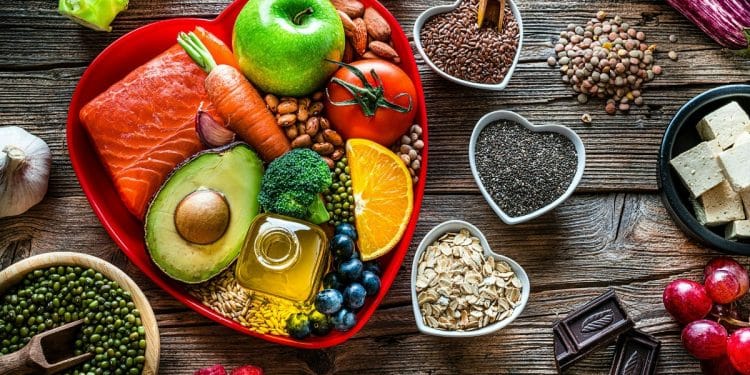Maintaining a heart-healthy diet is essential for overall well-being, as the heart plays a vital role in pumping blood and supplying oxygen to our body. Adopting a balanced and nutritious diet not only supports heart health but also contributes to a healthier lifestyle. In this article, we will explore the key components of a heart-healthy diet, what to include, and the top eight foods that can significantly benefit your cardiovascular health.
The Basics of a Heart-Healthy Diet:
- Fruits and Vegetables:
A heart-healthy diet begins with a generous intake of fruits and vegetables. These nutrient-packed foods are rich in vitamins, minerals, and antioxidants, which help reduce inflammation and protect the heart. Aim to include a variety of colorful options in your meals, such as berries, leafy greens, citrus fruits, and cruciferous vegetables.
- Whole Grains:
Opt for whole grains like brown rice, quinoa, oats, and whole wheat bread instead of refined grains. Whole grains provide fiber, which aids in maintaining healthy cholesterol levels and promoting a feeling of fullness. This can contribute to weight management, another crucial aspect of heart health.
- Lean Proteins:
Choose lean sources of protein to reduce saturated fat intake. Include fish, skinless poultry, legumes, and nuts in your diet. Fatty fish like salmon and trout are particularly beneficial due to their omega-3 fatty acids, which have been linked to a lower risk of heart disease.
- Healthy Fats:
While it’s important to limit saturated and trans fats, incorporating sources of healthy fats is crucial. Include foods rich in monounsaturated and polyunsaturated fats, such as avocados, olive oil, and nuts. These fats can help lower bad cholesterol levels and support overall heart health.
- Limit Sodium Intake:
Excessive sodium intake can contribute to high blood pressure, increasing the risk of heart disease. Be mindful of your salt intake by choosing fresh, whole foods and minimizing the use of processed or packaged foods. Use herbs and spices to add flavor to your meals without relying on excessive salt.
The 8 Best Foods for a Heart-Healthy Diet:
- Oily Fish:
Fatty fish like salmon, mackerel, and sardines are rich in omega-3 fatty acids, which have been shown to reduce the risk of heart disease. Aim to include at least two servings of oily fish in your weekly diet.
- Berries:
Packed with antioxidants, vitamins, and fiber, berries (such as blueberries, strawberries, and raspberries) support heart health by reducing oxidative stress and inflammation.
- Nuts:
Almonds, walnuts, and pistachios are excellent sources of heart-healthy fats, fiber, and antioxidants. Consuming a handful of nuts as a snack can contribute to improved cholesterol levels.
- Oats:
Oats contain beta-glucans, a type of soluble fiber that helps lower cholesterol levels. Incorporate oats into your breakfast routine through oatmeal, granola, or smoothies.
- Leafy Greens:
Kale, spinach, and Swiss chard are rich in vitamins, minerals, and antioxidants. These leafy greens contribute to lower blood pressure and reduced arterial stiffness.
- Avocado:
Avocado is a nutrient-dense fruit that provides monounsaturated fats, potassium, and fiber. Including avocados in your diet can help lower bad cholesterol levels and support overall heart health.
- Legumes:
Beans, lentils, and chickpeas are excellent sources of protein, fiber, and various heart-protective nutrients. Regular consumption can help manage weight and reduce the risk of heart disease.
- Tomatoes:
Tomatoes are rich in lycopene, an antioxidant associated with a lower risk of heart disease. Whether fresh or cooked, incorporating tomatoes into your meals can be beneficial for heart health.
The Importance of a Heart-Healthy Diet:
Prioritizing a heart-healthy diet is paramount for several reasons. Firstly, it can significantly reduce the risk of cardiovascular diseases, which remain one of the leading causes of mortality worldwide. Secondly, adopting these dietary habits contributes to weight management, lowers blood pressure, and improves cholesterol levels – all crucial factors in maintaining a healthy heart.
Furthermore, a heart-healthy diet can positively impact overall well-being, promoting better energy levels, enhanced cognitive function, and a lower risk of developing other chronic conditions. By making informed food choices and embracing a balanced approach to nutrition, individuals can empower themselves to take charge of their heart health and lead a longer, more fulfilling life.
A heart-healthy diet is not merely a choice; it is a commitment to nurturing your body and safeguarding your heart. By incorporating the recommended foods and making thoughtful dietary choices, you can actively contribute to the longevity and vitality of your cardiovascular system. Remember, small changes in your eating habits today can lead to significant benefits for your heart in the long run.










